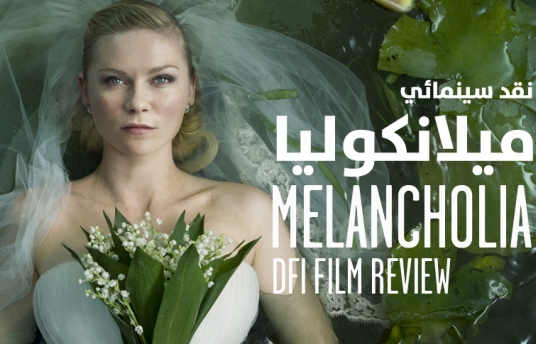DFI Film Review: Melancholia (2011)
Jun 12, 2011

Written by James Rawson, New Media, DFI
Film: Melancholia
Year: 2011
Director: Lars von Trier
Stars: Kirsten Dunst, Charlotte Gainsbourg, Kiefer Sutherland, Alexander Skarsgård
Genre: Drama, Science Fiction
When he shot to fame as a radical filmmaker with the ‘Dogme 95 Collective’, the name Lars von Trier instantly became synonymous with provocative cinema. Whether it’s the thinly veiled anti-American diatribes of ‘Dogville’ and ‘Manderlay’, or the graphic mutilation scenes of ‘Antichrist’, where von Trier goes, controversy usually follows. Unsurprisingly, few films at this year’s Cannes Film Festival were more highly anticipated than ‘Melancholia’: the latest work from the bad boy of European cinema.
‘Melancholia’ opens with Justine (Kirsten Dunst) and Michael (Alexander Skarsgård) arriving late for their own wedding, much to the distress of Justine’s neurotic sister and event planner Claire (Charlotte Gainsbourg). As Justine’s dysfunctional family immerse themselves in the party atmosphere, the bride retreats to her room, crippled by an unshakable depression. When she is finally persuaded to re-join the wedding guests, the party gather outside to launch paper lanterns, only to discover a strange light shining down on them. A new planet has been discovered in our solar system, and despite assurances that it poses no threat to Earth, a collision seems almost unavoidable.
Von Trier has once again drawn inspiration from the work of master Russian filmmaker Andrei Tarkovsky, inhabiting his characters in the world of the lead character’s mind. Despite Justine’s best attempts to appear happy and content to her friends and family, melancholia is destined to consume and envelope her, just as the newly discovered planet will inevitably consume and envelope the Earth.
There are a variety of elements that make ‘Melancholia’ remarkable, but the most striking are the visuals. The shots of all consuming hailstorms, interplanetary movements and super slo-mo Kirsten Dunst shooting lightning from her fingers are just some of the visual treats on display. While critics may have disagreed about the value of drama on show, they were unanimous in the praise of its aesthetic qualities. Coupled with outstanding performances from Kirsten Dunst (who won Best Actress at Cannes) and Charlotte Gainsbourg, and given a pitch perfect score from Kristian Eidnes Andersen, ‘Melancholia’ is a hugely impressive piece of cinema, if not always hugely enjoyable.
And why is it not enjoyable? Well, it’s ultimately a film about depression and how it affects the sufferers themselves, as well as the people around them. Von Trier’s experience is first hand (he often suffers from depressive episodes) so the drama and the characters are infused with an air of authority. He raises profound questions about the way we perceive the world, conventional notions of happiness and how we view our own mortality. Does this translate to a conventional Hollywood experience with a nice neat conclusion? Absolutely not. But it does provide you with an often uncomfortable, but always thought provoking piece of cinema, which in my opinion is of infinitely more value.
Melancholia - Trailer
إعلان فيلم ميلانكوليا